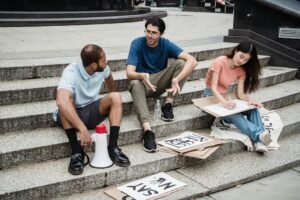The Dilemma
Hadiza tosses restlessly on the bed edged into the corner of her small room.
She went to bed last night well past midnight because she couldn’t sleep, and now, in the early morning hours, she doesn’t want to wake up to face her troubles.
She closes her eyes once more, willing herself to sleep. In her mind, she counts the dollars she has left in her bank account, a perverse version of counting sheep. She watches the dollars dwindle, as she imagines paying rent and buying food. There just isn’t enough left, and it does nothing to help her sleep. She opens her eyes once more to the gloom of her darkened room.
She reluctantly stands and wobbles towards the fridge, knowing there is nothing to eat. But maybe she can scrape together some leftovers as she has done in the past days. She opens the fridge and scans the empty white racks. She ate the last spoonful of peanut butter for dinner. She opens the cupboard beside the fridge see if there is any food left. She sees only the two cans of the luncheon meat she cannot eat because it is made from pork, and she is a Muslim. She feels the sob come from deep in her stomach, fueled by hunger. She cannot believe her Canadian dream has become a nightmare.
The Push factor
A couple of years ago, she lived a perfectly normal life in Borno State, Nigeria. She was a successful community health practitioner working with Action Aid to improve the health of marginalized people. She chuckles softly amidst tears, “I guess now I know what it is to be marginalized.”
Everything changed when Boko Haram insurgents swept in and started abducting people and bombing public facilities. Like a swing of an axe felling a tree, her life changed.
One morning, she woke up to the screams and moans of women in her neighborhood. The Boko Haram insurgents had gone into a boarding school close to her home and abducted 276 girls! No one felt safe. The government moved everyone in her village into refugee camps, and they had to live on aid from international humanitarian societies. Gone was her normal life, her chance to help other people. From that day forward, she was the one who needed help.
She moved to the Bakassi camp with her mother and two sisters, but life did not get easier. Meals were rationed, they slept in makeshift huts, and did the best to repress the trauma of displacement and insecurity. When the call came from her cousin, Idris, in Canada, and he said he could sponsor one member of the family, she felt like he handed her a rope to save her from drowning. Even though she felt like her mother should have been the first to escape, everyone elected her to go. She has the most education, they reasoned, and her elder sister has a daughter. Idris wanted the easiest candidate first, so that she could pave the way for everyone else. She’d be lying if she didn’t say she was relieved and excited for the opportunity, though she still feels terrible to be without her family. But once it was decided, she could not think of anything else but her life in Canada. While the sponsorship was processed, she counted days, hours, minutes, and even seconds.
Reflection
But standing in her kitchen in Canada, still as hungry as she used to be in the camp, makes her feel hopeless. She cannot complain because others back home have it far worse. She has no friends in Canada except for Idris, because she doesn’t know who she can trust.
Indeed, every part of her journey in Canada has been hard. Renting a home has been next to impossible. Between the steep rental requirements and the high demand, Idris had to stand in as a guarantor. She cannot work in public health because she needs to take a bridging program that she cannot afford, so she’s taken a casual job as a healthcare aide. Whenever she visits Idris, he complains bitterly about the rising cost of everything — groceries, gas, utilities, rent. He is gaining Canadian experience with transitional jobs, so even he is living from paycheck to paycheck. She knows she cannot ask him for anything more. He’s given her everything as it is.
She knows he’s struggling every day, just like her. And she cannot jeopardize his plans to get her sisters and mother from the camp in the coming year. Things are much worse in camps now; Halima told her the last time she called that some of the abducted girls are now suicide bombers, and two camps have been hit already.
She works her fingers through her phone scrolling through her notes to see all the newcomers’ center information she has saved. They can possibly help her, offering food, clothing, subsidized transit and more.
These centers can provide support but at what cost? Idris has told that everything she does leaves a paper trail, and no one can hide from the government.
So she stays hungry. She cannot be ungrateful. She cannot ask Idris for more help. And she cannot ask anyone else for help either, should it get back to the government and make them believe that he isn’t a good sponsor. Idris once told a joke about how law enforcement agencies will courteously and politely take your information, shower you with smiles as they pull out handcuffs, and lead you to what might as well be your destruction. She believes him. She knows it’s not actually a joke.
Resignation
But she’s so very hungry.
Her family will never forgive her if Idris gets into trouble. They believe she is in a better place, and she would rather starve and cry with her family than starve and deal with fear, anxiety, and alienation in the camps.
And yet, she has no food. What is she to do?
She stares at the phone number for the food bank. She feels so weak as she dials. Tears claw at the back of her throat as the phone rings and a voice on the other end greets her.
She swallows, hoping she’s not signing her family’s death warrant.
“Hello,” she says. Shaking and stuttering, Hadiza manages to speak, “Please, I have no food to eat.”



